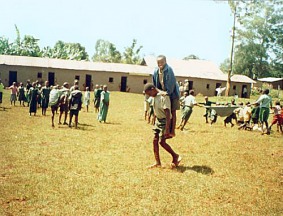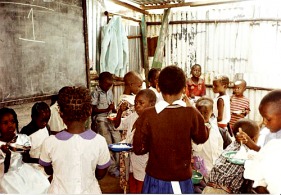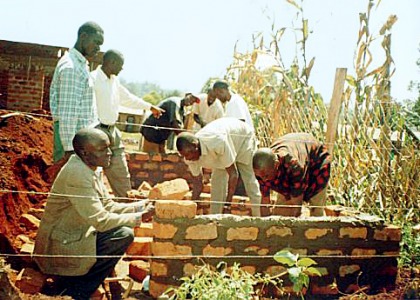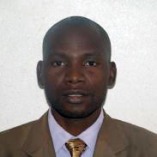Well, we managed to complete our first school year in Kimilili. What a fine celebration we had. I would like to extend a special thanks to all our teachers, school volunteers, and children guardians. Without your tremendous help, we would never be able to care for our children as we do. My gratitude is great.
I haven't written in our blog for a while because we are so busy setting up various school and community projects. We are truly doing a juggling act at the moment.
Our school projects include setting up some more song and poetry projects for the young children's group, learning about various professions and trades for the middle children's group, and a short film project for the older children's group. We have completed the project outlines and now we are working on defining the various tasks and persons to carry out the tasks in each group.
We have also started on a new HIV/Aids youth program. We would like to create a project that goes beyond just information and counseling of our youths. We would like the youths to become active in various drama or storytelling projects as well.
I have made initial contact with persons concerning a clear water and catchment project for the community. As is often the case in the area we live, clean water is a scarcity and we have to try and find a solution to this problem. Our children's health and the health of the community suffer because they lack clean water.
Something exciting happened last week. For the first time, Community Breakthrough Support mission had large public radio coverage. The moderator, Joseph Wanjala, of WESTI FM 99.8 spoke for over 15 minutes about CBSM. Even though we heard the programme and rejoice in the event, we can hardly believe it happened.
It all started on Kenyatta Day, Oct. 20. This is a day that is meant to honour the first president of Kenya, Mr. Kenyatta, in official style, when people gather together and participate in all sorts of public entertainment. On this day, our school children performed a song and a poem for the attending crowd.
A journalist approached us, wanting to know more about the children. Out of this conversation, came Joseph Wanjala’s request to air our activities. Of course, we readily accepted.
The day arrived. Unfortunately, the programme did not go on as scheduled, but was delayed for about 30 minutes. The committee members, who had been waiting to hear the programme since the morning, managed to reach me as I was out doing various tasks for the mission.
I rushed to a home nearby with a radio and listened to last half of the programme. This was the part where they were talking about our dilemma to find sufficient resources for the children. They went on and discussed both the short term and long term benefits of our project in the community. It was wonderful to hear people speak so positively about our work.
They finished by giving the two names of people behind the project: mine for local inquiry and Lia Hadley in Germany for other inquires. They also talked about “Our Song Circle - Wimbo Mviringo” site. They mentioned our wish for active participation from other schools.
The committee members, who had managed to listen to the whole programme, said it started with a recording of the performance of our children on Kenyatta Day. All in all, the programme managed to extensively cover our work and our vision for improving the health and education of our children. What a gift this is for our CBSM family.
There have been many inquiries since the programme was aired. Schools have been calling to find out more about “Our Song Circle - Wimbo Mviringo” site. This is very good and we will do our best to react promptly, so as to benefit from their interest. Many people, even some of our neighbours, have come over to offer their help. They didn’t realise what it is that we are doing. They were misguided and thought we were some up-and-coming private school. Thankfully, this radio program dispelled these notions.
Sadly, the programme has also triggered an inflow of potential applicants for needy children to be helped. Presently, we are struggling to feed and educate the 250 OVCs in our care. We just do not have capacity to admit any more at this time. The fact that so many people are coming to us asking for application admission forms challenges us. I have to talk to the elders’ council about these matters and see what can be done.
All in all, we are very thankful for Joseph Wanjala’s interest in BBSM and feel that such media exposure is a wonderful thing indeed.
 Recently, someone asked me what our children do with their days; what do they do at home or in school; what type of activities do they participate in. I thought I would write about these things.
Our children live either in our CBSM home/school facilities and are fully under our care, or, they live in alternative homes. We try to find alternative homes as much as possible for our children; family life is important for young children. Yet, in some cases the children are subjected to conditions that are not good. We can tell that is the case by changes in their behaviour, and then we move the child back into our home/school compound.
Normal Day Schedule
Wake up around 6 am
Activities
1. Pray
2. Bath
3. Eat breakfast
4. Go to school by 7:40 am
Meals
1. Eat breakfast in the morning
2. Porridge/tea at 10 am (when available)
3. Lunch at 1 pm
4. Tea/porridge at 4 pm (when available)
5. Supper/dinner between 6:30 pm and 7:30 pm
Journey to School
The children who do not live at the CBSM children’s home, and this is the majority of our children, walk various distances to school each day. Some are fortunate and live very close to the school. Some live very far away, approximately five to ten kilometres away.
 Recently, someone asked me what our children do with their days; what do they do at home or in school; what type of activities do they participate in. I thought I would write about these things.
Our children live either in our CBSM home/school facilities and are fully under our care, or, they live in alternative homes. We try to find alternative homes as much as possible for our children; family life is important for young children. Yet, in some cases the children are subjected to conditions that are not good. We can tell that is the case by changes in their behaviour, and then we move the child back into our home/school compound.
Normal Day Schedule
Wake up around 6 am
Activities
1. Pray
2. Bath
3. Eat breakfast
4. Go to school by 7:40 am
Meals
1. Eat breakfast in the morning
2. Porridge/tea at 10 am (when available)
3. Lunch at 1 pm
4. Tea/porridge at 4 pm (when available)
5. Supper/dinner between 6:30 pm and 7:30 pm
Journey to School
The children who do not live at the CBSM children’s home, and this is the majority of our children, walk various distances to school each day. Some are fortunate and live very close to the school. Some live very far away, approximately five to ten kilometres away.
Quite often we are asked how children find their way to the Benando Breakthrough Support Mission. There is no typical way. The family and living circumstances of the children vary, but they generally belong to one or more of these categories:
* Children on the street
* Orphans
* Children of imprisoned parents
* Neglected
* Abandoned/abused/heart broken children
* Rescued child labourers
* Child mothers
* Rescued commercial sex workers
* Children of widows or single mothers that cannot care for them
The children are most often brought to use by good Samaritans, neighbours, police, and social services officers. Even though there is no typical way that describes how children find their way toCBSM, there are usual ways. In a later blog post, I will write how formal and informal processes are practised.
For now though, I thought I’d share with you the story of Wanjala*, who came to us last February. Wanjala came to our project on his own. He had fresh wounds on his leg as a result of political skirmishes in Mt Elgon, but fortunately he managed to flee further dangers.
Many of the people were running towards Kimilili to flee the violence, and so, he managed to accompany them. It was a long way to Kimilili, but the people had no choice in where to go because the other side of Mt Elgon has extensive forested areas with wild animals, cliffs and rocks: after which is Uganda.
Wanjala knew nobody when he arrived in Kimilili. A good Samaritan took him to the council of elders in this area. The council of elders gave Wanjala a letter of introduction to our project. Even though he was assured we would take care of him, he was scared.
He was in a lot of pain from his leg injury, unsettled in spirit because of the violence he’d recently escaped, and hungry after the long journey. We took the initiative of taking him to the government hospital, where his wound was dressed. We were also fortunate in being able to identify, at a later point in time, a distant relative of his. We went and talked to him and he accepted Wanjala into his family’s home.
It is now eight months later. Wanjala lives near the CBSM facilities and attends our school. His leg injury has healed and he has settled into life at CBSM. Wanjala is doing well in school; he is studying without problems. He plays football, participates in our drama group, and enjoys singing in our choir. Because of his age, we have also given him responsibilities of a school prefect. He has made friends amongst his schoolmates. More importantly, he is now a member of our BBSM family.
* Name has been changed. Wanjala is common name in this region. It means famine and it is given only to children born during famine/hunger season.
I’ve just managed to make a few photos of our project that I would like to share with you over the next few days.
The people in this photo were hired to build a house in the neighbourhood. The house is made of bricks. The people are part of the Kimilili community, our neighbours, and our helpers since we came here.
None of the people in this photo came with us from Nairobi; rather they are part of the community that appreciates the CBSM coming to Kimilili. They do work often (when funds are available) and they share in helping us take care of the children’s needs.
There are other ways the community extends their hand of participation & help to us. They offer us food donations, especially, when they have harvested crops. The women come weekly to smear the classrooms’ floors with cow dung; as they are not cemented and must be made free of dust. They help in preparing food for free. They even occasionally give us donations of firewood.
And most importantly, they provide alternative homes for the needy children, by reducing the burden from on CBSM home. Some neighbours have taken some children to keep company with their kids (age mates), hence taking on extra responsibilities upon themselves. Neighbourly pastors come weekly and teach the children the word of God, also assist us.
In one of our national languages, Swahili, we call this sort of unity “harambee”. It means people coming together or joining hands for a common public goal.
|







 RSS Feed
RSS Feed